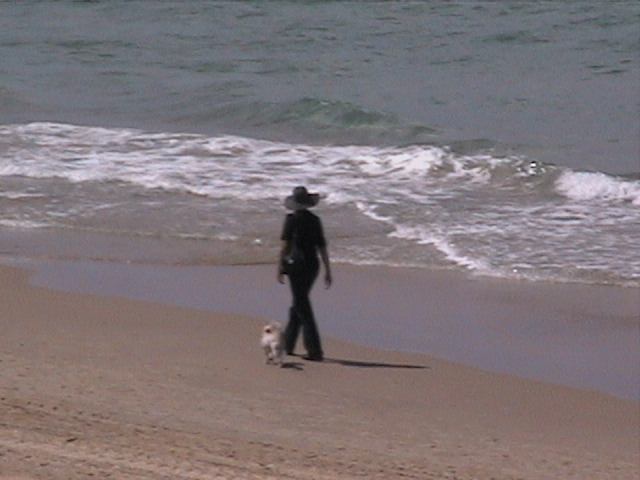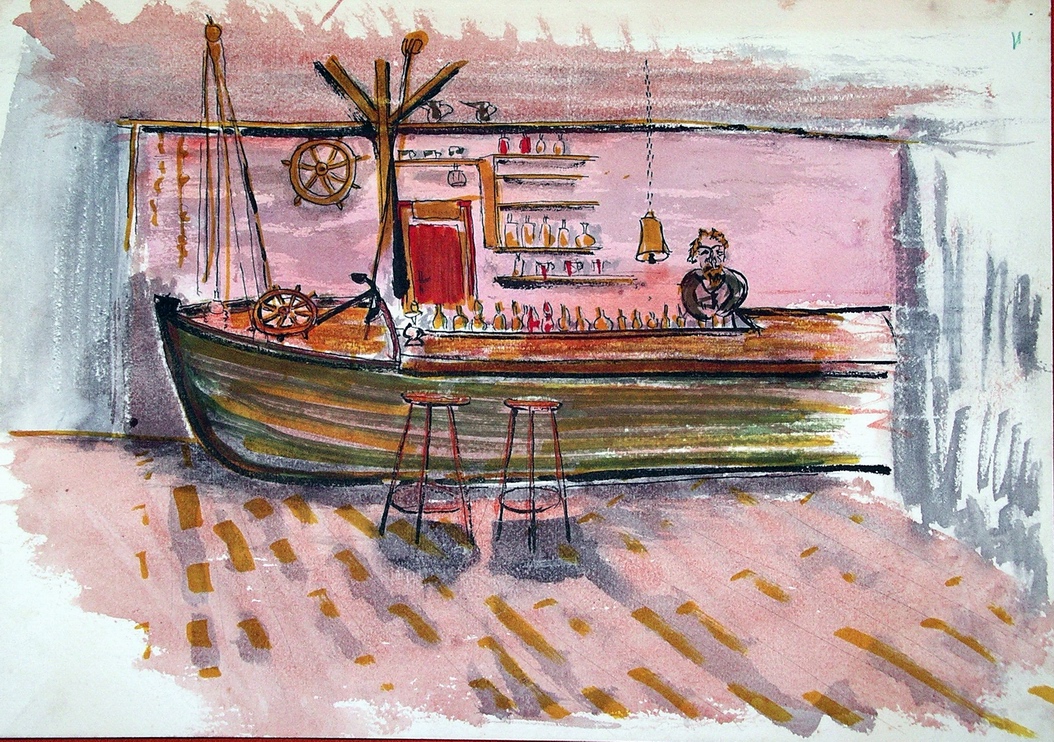
ı
September 24, 2004
The eminent poet Moshe Dor was honored last night at a literary evening at the Mishkan Leomanuyot in Herzlia. The evening was almost as solid and as serious as it sounds. But his poetry rose above all the standard limitations of literary evenings. The author of "Erev Shel Shoshanim," (Evening of Roses) and "Tapuach Hinnani" (Charming Apple) --love songs which have become not only part of the folk culture but also folk dances that bring a tear to my eye whenever the music comes on -- has been living in the U.S. with his American beloved, the poet Barbara Goldberg, for many years, and his poetry has changed. His language is more pure, more affective, and more complex, and his central subject is the profound longing for the land that was through the perspective of the world that is. It is amazing poetry and I wish there were a more comprehensive media and audience for his work. The 100 people who packed themselves into the Mishkan were primarily those who knew his work from before - people of my age - and it seemed to me a great loss that more people of other generations have not learned of his work. Rafi Weichert, his publisher, says that the audience for poetry is problematic because the complexity of language eludes the younger generation. In the case of Dor, whose poetry is so personal, direct, and deep, it is a real shame.
Got to get ready for Yom Kippur
HELP!!! I WROTE OVER THE SEPTEMBER 19-23!!! IT HAD ALL THE RECIPES FOR RIDGELE, SHCHAV AND THE GREAT STORY OF SCHULAMITH GAMBLING WITH THE GUARD TO LET SHUSHA INTO THE SEA! HAS ANYONE BY ANY CHANCE COPIED IT?
Let me try to reconstruct some of it. Yesterday, the day before Yom Kippur Schulamith said she wanted to see a HAVATZELET HA'SHARON (rose or lily of the Sharon, or Pancratium Maritimum ). I assumed that she was thinking about the symbolic significance of it, the flowering of the desolate land, its transformation into "the excellency of Carmel and Sharon" (Isaiah 35:1-2), and its whiteness signifying the purity from sin. It's one of only three flowers mentioned in the bible and appears in the Song of Songs (verse 2:1), so it must be important, and it is so beautiful and only appears for a while around this time of the year. So we took Shusha and went to the beach, where it flowers.
That was a mistake, because when we got to the beach, we were told dogs were not allowed. We drove to the next beach north, and were told the same thing. This time, however, Schulamith did not let my Anglo-Saxon subservience win. She moved up to the window of the entrance booth and peeked in. "And if I win you at backgammon can she come in?" she whispered. "You can't win me at backgammon," he said with a sense of security. After all, a middle-aged,haredi woman, what chance did she have. So Schulamith gambled for Shusha's entrance into the sea, and won. And she photographed her flower:

This is how Shusha benefited from Schulamith's wage:

Blissful, eh?
To see some of the other side of what goes on here, you might want to check out when CNN is showing the film Impact of Terror in your area.
We pre-empted Yom Kippur at a crowded Nona today. There was a pre-Yom Kippur hysteria - pre-empting hedonism. The shopping centers were totally crowded, the cafes were packed, and there was a sense that the intense pleasure would soon be curtailed. By 2 Nona was closing up and there was almost no cars on the street. By 3 we ourselves were home and noone was to be seen. Yom Kippur started around 5 and so did the bicycles. In the past I have noted often how the division between the religious and the non-religious is made salient on this day, but this time i was impressed with how universally the respect for this day was observed.
That night we climbed the hill behind the university that looks down on all of Tel Aviv and Ramat Gan and there was an amazingly beautiful silence. The highways were empty, the streets were quiet. If there were neighborhoods where there were cars, or apartments holding wild parties, they were unobserved.
And today I developed a hunger for the past, for old Israel, and the way it was. I looked through Bandi's drawings and found the one I've been thinking of for months. Then I pumped Ezi for the hundredth time for details.
When Ezi was a teen his parents would spend their weekends in Tiberias at Maxim Solomon's. They would sleep outside under the trees, and spend their days at the beach. After a few years a motor boat and skis were introduced and Ezi became the youngest of the ski pioneers - the first people to ski on the sea of Galilee. I have heard there are photos of these weekends but need to find them.
Maxim Solomon was a Tel Aviv newspaper photographer - from that wonderful revolutionary gossip rag, Olam Hazeh - who discovered a new life in Tiberias. He built a fishing club, nightclub, and beach called "minus 206," and his bar from a fishing boat. Here's the bar:

All the in Tel Aviv people came there - Yossi Yadin, Uri Avneri, even Beautiful Sarale- and you can see why.
You can also see how great Bandi draws. We have hundreds of his water colors, acquarelles, etc., some of Tel Aviv, many of Tiberias, and great deal of the local flora and fauna.
Maxim Solomon was a particularly interesting photographer - I've found only one of his works on line, however. It's here. The hot dog vendor at Kikar Mugrabi too was apparently an important institution in Tel Aviv for many years.
Charles reminded me that in the pages I erased I had written about Reuters' and the word "terrorist." This is one thing I saved, but probably didn't post:
As Islamic terror continues to spread worldwide, one major news outlet decided that enough is enough -- it's time to call terrorism by its name. CanWest, owners of Canada's largest newspaper chain, recently implemented a new editorial policy to use the 'T-word' in news reports on brutal terrorist acts and groups.
So when CanWest's National Post published a Reuters report on Sept. 14, they exercised their right to change this Reuters line that whitewashes Palestinian terror:
"...the al-Aqsa Martyrs Brigades, which has been involved in a four- year-old revolt against Israeli occupation in Gaza and the West Bank." (Jeffrey Heller, 9/13 'Sharon Faces Netanyahu Challenge')
to this, more accurate line:
"...the al-Aqsa Martyrs Brigades, a terrorist group that has been involved in a four-year-old campaign of violence against Israel."
Reuters didn't like the adjustment, and took the unusual step to officially inform CanWest that if it intended to continue this practice, CanWest should remove Reuters' name from the byline. Why? The New York Times reported:
"'Our editorial policy is that we don't use emotive words when labeling someone,' said David A. Schlesinger, Reuters' global managing editor. 'Any paper can change copy and do whatever they want. But if a paper wants to change our copy that way, we would be more comfortable if they remove the byline.'
"Mr. Schlesinger said he was concerned that changes like those made at CanWest could lead to 'confusion' about what Reuters is reporting and possibly endanger its reporters in volatile areas or situations. 'My goal is to protect our reporters and protect our editorial integrity,' he said
According to Mr. Schlesinger, members of Reuters' sales staff in Canada have asked CanWest to remove writers' names to conform to its guidelines for the use of "terrorist." Reuters has also asked that CanWest add its name to that of Reuters as the source of revised articles and to display that information only at the end of the articles. Alternatively, Reuters suggests that its name not be used at all.
Scott Anderson, editor in chief of CanWest publications and an author of the policy, said Reuters' rejection of his company's definition of terrorism undermined journalistic principles.
"If you're couching language to protect people, are you telling the truth?" asked Mr. Anderson, who is also editor in chief of The Ottawa Citizen. "I understand their motives. But issues like this are why newspapers have editors."
Mr. Anderson said the central definition in the policy was that "terrorism is the deliberate targeting of civilians in pursuit of a political goal."
The policy has caused Mr. Anderson's paper to issue two corrections recently as the result of changes it made to articles provided by The Associated Press. On Thursday, The Citizen changed an A.P. dispatch to describe 6 of 10 Palestinians killed in the West Bank by Israeli troops as "terrorists," a description attributed to "Palestinian medical officials." The Associated Press had called those people "fugitives."
The Citizen published a correction on Friday declaring it to be it an editing error and describing the six dead as "militants." A week earlier, the newspaper inserted the word terrorist seven times into an A.P. article about the fighting between Iraqis and United States forces in the city of Falluja. Mr. Anderson called the two episodes "silly errors."
Late Friday, a spokesman for The Associated Press, Jack Stokes, issued a general statement about changes to its articles. "We understand that customers need to edit our stories from time to time," it said in part. "However, we do not endorse changes that make an A.P. story unbalanced, unfair or inaccurate."
... In an editorial published on Saturday, however, The National Post said it would continue to follow its current policy.
"Mr. Schlesinger's broader implication - that the substantive meaning of his reporters' stories are being universally vitiated by our house style - is one we reject," it said. "The agency's use of euphemisms merely serves to apply a misleading gloss of political correctness. And we believe we owe it to our readers to remove it before they see their newspaper every morning."
(http://www.nytimes.com/2004/09/20/business/media/20reuters.html )
Let me remind you that I am a poet, that language is life and death to me, and I see over and over again the fact that it is perhaps not the poet, but what the poet sees to be most significant, that is at the basis of our understanding and our framing of the world.
And our frame creates the world.
Today I saw "The Contender," the 1930 film about Max Schmeling, Hitler's hope for German sports. Schmeling plays himself, Kurt Gerron plays his agent - Benny Baker, and the manager is played by his manager. This curious blend of fact and drama is even more interesting in retrospect. Schmeling, who wouldn't join the Nazi party and was therefore drafted by Hitler and sent to suicide missions, actually saved Jews in the Holocaust (see the Auschwitz site. The number of points of Gerron's own fate that are touched on in the film - including Gerron himself saying "We want very much to go to America" - is terribly poignant. But the film is interesting on its own, for its shots of Schmeling in the ring, its honesty in Schmeling playing a younger, more foolish Schmeling, its blending of silent and talking pictures.
September 26, 2004
The alarm went off as I left the drug store - and the poor clerk had to go through all my purchases to see what hadn't been neutralized. She just couldn't find it and I kept passing the bag back and forth through the doorway until we finally figured out there was an additional tag in the shaving cream. All this would have been a totally forgettable experience except that the clerk was a very embarrassed Arab girl.
Check out this organization The Center for Jewish-Arab Economic Development
is an "Israeli non-governmental organization that aims to close the gaps between the Jewish and Arab sectors in Israel, thus building the foundation for sustainable economic development and peace."
September 27, 2004
Listen, it may not be too late to recover the diary from september 19-23. If you read that entry, it may still be on your computer. Nachum wrote me the following directions.
Open Explorer.
Choose "Work Offline" from File menu
Answer "stay offline", if asked
Goto url address: http://www.karenalkalay-gut.com/diarysept1904.html
[If this looks right, then...]
Save as "web page complete" under File
Rest "work offline"
Even if you have only part of it I will be very grateful!I just haven't been able to keep writing with joy since i wrote over those files.
Got lost today in Tel Aviv. I was very tired but suddenly decided I had to go to the printers, the guys who did my last two books in Israel. We just couldn't work things out over the phone and e-mail. So I got in the car - I knew exactly where to go, get off at LaGuardia, turn right, go straight past the bulldog and take the first right. Unfortunately, however, the exit at La Guardia is being repaired, and I found myself somewhere else. It should have been no problem, but I had no idea what the street was, or how to get there. Well, I had ideas, but every other street was one-way or no-entrance and it took me forever to get onto the street whose name i finally remembered. But after I parked, and walked the two blocks back to the printers, it turned out they had moved. The new address was written in pencil on the wall. Eventually I got to the new place - Ezi served as my GPS - but it has been a long time since I'd driven around the old central bus station and things have changed. Oh, sure, the buildings are still ramshackle, but all the ads for apartments are in broken english instead of broken hebrew.
September 28, 2004
When I first moved to Israel I had a powder blue Peugeot 404, an incredibly popular car around here, and I spent a lot of time in south Tel Aviv. So it was not unusual that men would call out at me, "Is it for sale?" wherever I went. I was reminded of it today when I took Shusha to the printers. On the two-block walk down Levanda Street two different men asked me, "The dog, is it for sale?"
Yes, it was also a come-on once, but I don't think it's appropriate any more.
But while I'm on the subject and reminiscing, another story springs to mind. I was walking with Mocha, an enormous and friendly pooch, when a limosine slowed down beside me. The driver, a soldier, rolled down his tinted window and said, "My commander wants to know how old the dog is." I liked the madness of it and answered: "I'm so glad you asked - he just had his seventh birthday last week!" Then the commander rolled down his window in the back and said, "Great! Let's celebrate together!"
